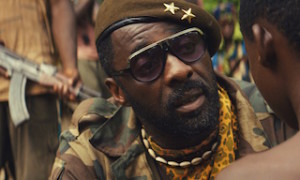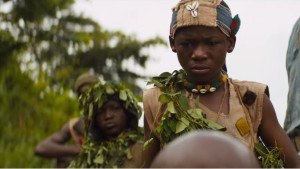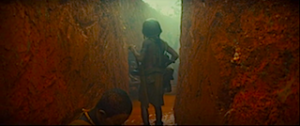A couple of weeks ago, my co-worker and I got an opportunity to sit down in a room full of pastors and church leaders from the city of Appleton and listen to the director of World Relief and a pastor from the Democratic Republic of Congo. The director, a Lutheran by the name of Charles, shared a long in-depth history of exploitation by Western nations, political turmoil, and religious and tribal warfare that has made The Congo a very dangerous and ravaged area.
Marcel, the pastor of one particular city in the NE part of the DRC, expanded further on the cycle of exploitation, tribal differences, and how the Gospel and indigenous Christian churches are bringing healing and reconciliation among the varying tribal groups. Amidst all of this, one particular statement struck me and has stayed with me since the presentation. When referring to the people of Congo and the refugees World Relief has located to our area, Marcel said, to paraphrase, “The people you see may be wearing smiling faces, but inside they are ruined. They have lost loved ones, experienced so much, that they hearts have suffered devastation.”
Cary Joji Fukunaga’s Beasts of No Nation, the first feature-length fictional movie released by Netflix, certainly captures the devastation Africans have endured. Set in a nondescript West African nation, the story follows 12-year old boy Agu, and his heart-rending journey from a normal pre-teen boy, to an orphan, to a captive, and eventually to a child solider in the army of the NDF. Another nondescript name, the militia group is a stand-in for the countless acronym sporting outfits that have come to populate the headlines about African nations.
The NDF is headed by a swaggering, imperious leader known only as “The Commandant” and played with brawny assurance by Idris Elba. While a lot of Elba’s roles require him to look really good, which he does, this performance drew from a different place for Elba. In a role that could have easily derailed into megalomania, he comes across as a dedicated, confident, and capable soldier bent on his objectives and dedicated to having a disciplined, fearless band. He has a cult leader-esque charm that instills loyalty and familial warmth, but can turn in an instant to ruthless brutality if you fail or prove disloyal. You’re never sure exactly what Elba’s Commandant is capable of, but by the end of the movie you’ve pretty much seen he is capable of anything and everything.
Agu, an unwitting addition to the Commandant’s roving band of NDF troops, is superbly acted by newcomer Abraham Attah. In fact, his performance was so well received at the Venice Film Festival, where the movie debuted, Attah took home the Marcello Mastroianni Award given to the best emerging actor or actress. The part is partially commonplace, asking Attah to be a small boy caught in a terrible situation. However, Attah is measured and realistic in his portrayal of a young boy forced to grow up through the atrocities of war. In fact, he deftly maneuvers the complex emotions of combat with a matter-of-fact voiceover at critical junctures and a timid ferocity when required of him as Agu slips deeper and deeper into the bloody savagery of his soldierly companions.
It is understated to say Beasts of No Nation is a brutal, harsh movie that cuts deeper than our common view of conflict in African nations. Fukunaga has stated the movie was not made to educate Westerners on the atrocities of war, but dives deeper into what a human being, specifically a young boy, experiences when being caught up in a conflict like what is happening in different African nations. There is no cultural context or societal norm in any part of the world that can prepare you for when Elba’s Commandant calls on Agu to kill his first person. It’s horrific, violent, and jarring when perpetrated by a 12 year-old.
*if you continue, its gets a little spoiler-y*
 However, what Westerners have learned about African conflicts and child soldiers are usually relegated to sidebar news; scrolling by after two or three seconds to the ‘meme of the week’, or it is through sensationalistic campaigns like #KONY2012. In one particular scene, we see a caravan of UN branded vehicles roll by the NDF battalion. As they pass by, we see white Westerners of unknown origin snapping pictures with their DSLR cameras. It is only a quick beat in the larger scope of the movie, but it communicates a great deal about how Westerners have approached these conflicts. We don’t doubt for a second there is turmoil in Africa, and when we roll by we snap pictures. We see the bodies, we see the child soldiers, but all we have are our pictures and our headlines.
However, what Westerners have learned about African conflicts and child soldiers are usually relegated to sidebar news; scrolling by after two or three seconds to the ‘meme of the week’, or it is through sensationalistic campaigns like #KONY2012. In one particular scene, we see a caravan of UN branded vehicles roll by the NDF battalion. As they pass by, we see white Westerners of unknown origin snapping pictures with their DSLR cameras. It is only a quick beat in the larger scope of the movie, but it communicates a great deal about how Westerners have approached these conflicts. We don’t doubt for a second there is turmoil in Africa, and when we roll by we snap pictures. We see the bodies, we see the child soldiers, but all we have are our pictures and our headlines.
But the people of Africa, and the child soldiers that horrify and sicken us, are much more than words on a webpage or photographs on CNN. As Agu fluently impassions towards the end of the film:
“I saw terrible things and I did terrible things. So if I’m talking to you, it will make me sad and it will make you too sad. In this life, I just want to be happy in this life. If I’m telling this to you, you will think that I am some sort of beast… or devil. I am all of these things, but I also having mother… father… brother and sister once. They loved me.”
Fukunaga’s plea though Agu is to see beyond the hellish realities of war atrocities beyond the faces, beyond the guns, to the heart of the matter. Not just the children, but all of these men, have done horrible things, yet they have families, a past, and hopefully a future; but it is all colored by the harsh reality of war.
And the brutalities of battle are hellish and touch everyone. Fukunaga, who wrote the screenplay, directed the movie, and was the cinematographer, leaves no stone unturned as the story meditates on Agu’s accursed journey. Where early scenes show his town and his family dancing and celebrating God together, later scenes have Agu reflecting pensively on God’s role in his life and the atrocities being committed. After one sequence in a embattled house, shot like it was straight out of a police drama like True Detective, another Fukunaga project, Agu ponders amidst the embattled chaos, “God, are you watching what we are doing?” As if being snapped out of a fevered dream, Agu runs over to a woman about to be raped and shoot her in the head. Its a brutal sequence, but is meant as a merciful act to end her pain.
 Later, as his and the Commandant’s fortunes both take a turn for the worse, Agu sloshes through a blood-red trench. We’re never 100% sure if it is a camera effect meant to heighten the hell-on-earth reality he has endured, or if the water and surrounding dirt is naturally red. Regardless of the effect itself, Agu has witnessed the horrors of hell and now literally exists in a hellscape. As his feet splash through brackish water and pass by semi-conscious NDF companions and some dead bodies, he introspectively narrates, “Mother, I’m talking to you because God is not listening.” War has done its best to silence the voice of God in Agu and it echoes the Preacher of Ecclesiastes:
Later, as his and the Commandant’s fortunes both take a turn for the worse, Agu sloshes through a blood-red trench. We’re never 100% sure if it is a camera effect meant to heighten the hell-on-earth reality he has endured, or if the water and surrounding dirt is naturally red. Regardless of the effect itself, Agu has witnessed the horrors of hell and now literally exists in a hellscape. As his feet splash through brackish water and pass by semi-conscious NDF companions and some dead bodies, he introspectively narrates, “Mother, I’m talking to you because God is not listening.” War has done its best to silence the voice of God in Agu and it echoes the Preacher of Ecclesiastes:
“I saw the tears of the oppressed—and they have no comforter; power was on the side of their oppressors—and they have no comforter. And I declared that the dead, who had already died, are happier than the living, who are still alive. But better than both is the one who has never been born, who has not seen the evil that is done under the sun.” -Ecclesiastes 4:1-3
Countless evils have been witnessed in the movie, perpetrated against and by those of the NDF, and as another trooper says before his death, again, borrowing from the Preacher, “It was all for nothing.”
The seeming hopelessness of Fuknaga’s story, and trust me, the predominate notion in this movie is suffering and loss, is redeemed through the innocuous quote of a sociopath and the final shot of this movie.
The Commandant is left wanting at the end, but not before delivering the line, “This is not God’s work, but man’s.” While said in the context of losing his position and his purpose, it is a reminder that murder and war is not the heart of God. Human’s sin and treatment of one another leave us with no excuse, but there is redemption and restoration for us.
When Agu has a chance to rebuild a normal life, he is encouraged by a teacher in a rehabilitation area for child soldiers to share his story. On Agu’s desk is a Holy Bible. It is not explicitly stated, but it is a reminder that our story can be redeemed by the greatest of stories, the good news of the Gospel. And we are left on a hopeful note as Agu chooses to tell his story of death, loss, murder, and war, and then join other boys playing in the ocean. Maybe, just maybe, he can recapture the boyhood war took from him and his story, along with those who have experienced this devastation, can be moved by redemption.

